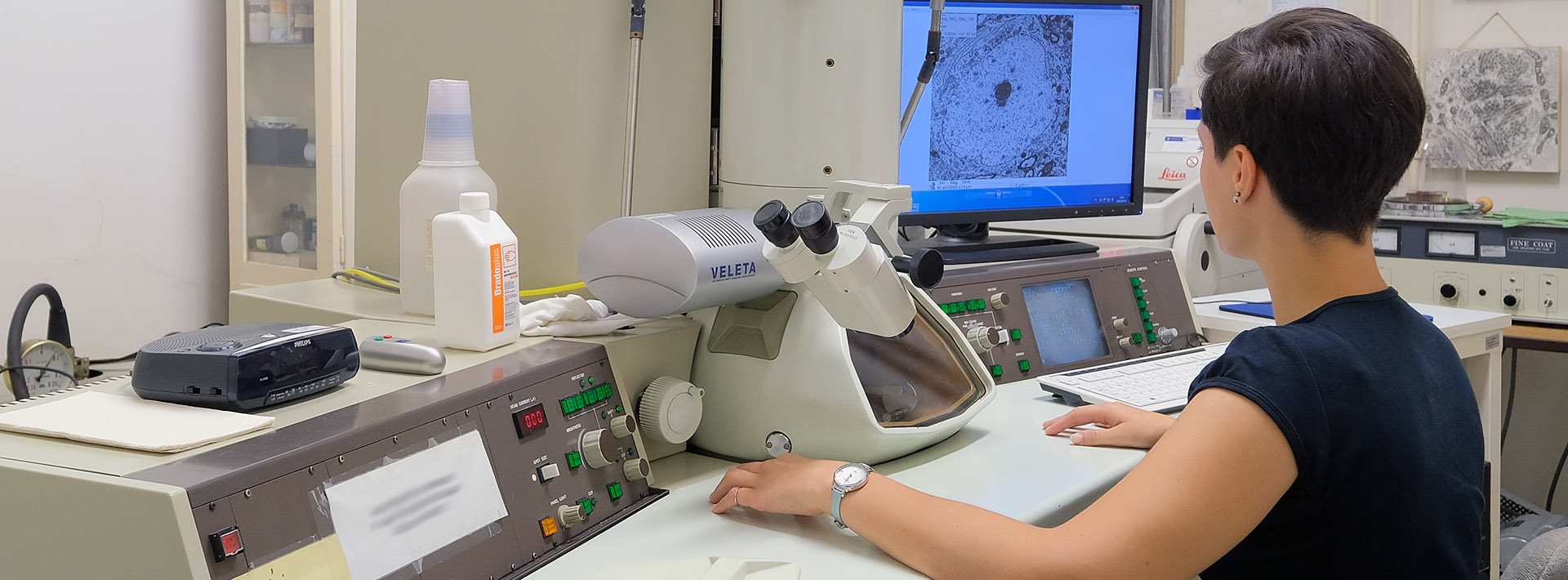Adatok
A Tantárgybejelentőben megadott hivatalos adatok az alábbi tanévre: 2023-2024
Tantárgyfelelős
-
Dr. Marianna PAP
associate professor,
Department of Medical Biology and Central Electron Microscope Laboratory
Óraszámok/félév
előadás: 28 óra
gyakorlat: 0 óra
szeminárium: 0 óra
összesen: 28 óra
Tárgyadatok
- Kód: OBA-107-E
- 2 kredit
- Biotechnology MSc
- Basic modul
- autumn
Nincs
Vizsgakurzus:Igen
Kurzus létszámkorlát
min. 5 fő
Tematika
The aim of the course is to provide molecular and cellular biological basic knowledge for future biotechnological studies.
The course covers cellular and molecular characteristics of the structure and functions of the cell. Main topics: functional morphology of eukaryotic cells; mechanisms of cell cycle, replication, DNA repair, transcription, translation, gene regulation and vesicular transport. We will discuss the general structure and function of the cytoskeleton, mitochondria, cell membrane and extracellular matrix components.
Előadások
- 1. Separation methods (Centrifugation) - Dr. Pap Marianna
- 2. Separation methods (chromatography, electrophoresis) - Dr. Pap Marianna
- 3. The functional morphology of the cell, comparison of pro- and eukaryotic cells - Dr. Pap Marianna
- 4. Structure of the cell nucleus, The structure and composition of chromatin - Dr. Pap Marianna
- 5. Eukaryotic genome organization - Dr. Pap Marianna
- 6. The phases and regulation of the cell cycle - Dr. Pap Marianna
- 7. Cell division (mitosis and meiosis) - Dr. Pap Marianna
- 8. Cell division (mitosis and meiosis) - Dr. Pap Marianna
- 9. General features of DNA replication - Dr. Pap Marianna
- 10. The mechanism of DNA replication - Dr. Pap Marianna
- 11. DNA repair - Dr. Pap Marianna
- 12. Transcription and RNA processing in prokaryotic cells - Dr. Pap Marianna
- 13. Synthesis and processing of the rRNA in eukaryotic cells - Dr. Pap Marianna
- 14. Synthesis and processing of the mRNA in eukaryotic cells - Dr. Pap Marianna
- 15. Midterm test - Dr. Pap Marianna
- 16. Midterm test - Dr. Pap Marianna
- 17. The role of mRNA, tRNA and ribosomes in translation. The genetic code - Dr. Pap Marianna
- 18. Mechanism of translation - Dr. Pap Marianna
- 19. Mechanism of gene regulation in prokaryotic cells - Dr. Pap Marianna
- 20. Mechanism of gene regulation in eukaryotic cells - Dr. Pap Marianna
- 21. Functions of the endoplasmic reticulum, protein glycosylation, Vesicular transport - Dr. Pap Marianna
- 22. Cell defense mechanisms - Dr. Pap Marianna
- 23. The structure and function of mitochondria - Dr. Pap Marianna
- 24. The cytoskeleton - Dr. Pap Marianna
- 25. The cell membrane, cell-cell junctions, transport processes - Dr. Pap Marianna
- 26. The extracellular matrix - Dr. Pap Marianna
- 27. Semester test - Dr. Pap Marianna
- 28. Semester test - Dr. Pap Marianna
Gyakorlatok
Szemináriumok
A tananyag elsajátításához szükséges segédanyagok
Kötelező irodalom
Saját oktatási anyag
Lecture slides will be provided.
Jegyzet
Ajánlott irodalom
Cooper G.M.: The Cell. A Molecular Approach
Karp G.: Cell Biology
Lodish et al.: Molecular Cell Biology
Alberts et al.: Molecular Biology of the Cell
A félév elfogadásának feltételei
Maximum of 15 % absence allowed
Félévközi ellenőrzések
Mid-term test and a final test.
Távolmaradás pótlásának lehetőségei
No possibility to make-up the lectures.
Vizsgakérdések
THEORETICAL EXAMINATION QUESTIONS
1. Proteins
2. Lipids
3. Carbohydrates
4. Nucleosides, nucleotides
5. The structure of DNA
6. The structure and classes of RNA
7. Comparison of pro- and eukaryotic cells
8. The structure of cell nucleus
9. The organisation of chromatin
10. Unique and repetitive sequences
11. The chemical composition of chromatin
12. The phases of cell cycle
13. The regulation of cell cycle
14. Mitosis and meiosis
15. General features of replication
16. The mechanism of replication in prokaryotes
17. Eukaryotic replication
18. DNA repair
19. The mechanism of prokaryotic transcription
20. General features of eukaryotic transcription
21. Synthesis and processing of eukaryotic pre-rRNA
22. Synthesis of pre-mRNA in eukaryotes. Cap formation and polyadenylation
23. Pre-mRNA splicing
24. Synthesis of aminoacyl-tRNA
25. The structure and function of ribosomes
26. The genetic code
27. Steps of translation
28. General features of translation
29. The lactose operon
30. The tryptophan operon
31. Levels of regulation of eukaryotic gene expression
32. Eukaryotic transcription factors
33. The mechanism of action of steroid hormones
34. Rough endoplasmic reticulum
35. Golgi complex. Protein glycosylation
36. The mechanism of secretion
37. Endocytosis
38. The mechanism of vesicular transport
39. Lysosomes. Smooth endoplasmic reticulum
40. Oxygen free radicals. Membrane damage. Lipid peroxidation
41. The structure and function of mitochondria
42. The genetic apparatus of mitochondria
43. Mitochondrial diseases
44. Microtubules
45. Microfilaments
46. Intermediate filaments
47. The cell membrane
48. Cell junctions
49. Passive and active transport
50. The extracellular matrix
Vizsgáztatók
- Dr. Pap Marianna
- Németh Marica
